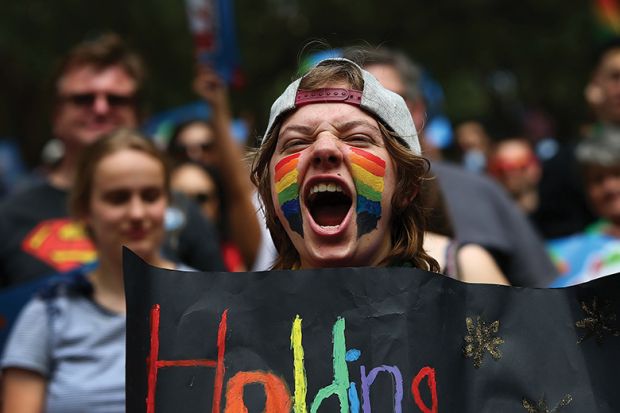Australian education minister Dan Tehan has invited universities to trump each other’s free speech rules, saying institutions will be judged against the least restrictive of their peers.
Mr Tehan said that universities would be encouraged to double down on the model free speech code released in April by former High Court chief justice Robert French. “If any university wants to go further than the code, I fully support that,” Mr Tehan told Times Higher Education.
“If we got an arms race of openness, there’d be nobody happier than me.”
The code, produced as part of Mr French’s review of free speech on campuses, allows universities to veto speakers considered likely to say something that breaks the law, significantly undermines scholarly standards or prejudices universities’ ability to foster the well-being of their staff and students.
UNSW Sydney vice-chancellor Ian Jacobs has warned that these conditions are too restrictive, insisting that law should be the only constraint.
Mr Tehan said that he had discussed the issue with Professor Jacobs. “I’ve encouraged him, if he wants to go further, absolutely to go further. Then I will use that as the benchmark that all other universities should aspire to,” the minister said.
The minister said that he wanted to achieve “100 per cent adoption” of the code by next year, but expected each university to apply the code in different ways. “Obviously there are different requirements on every university based on how they’re legislated and the rules and regulations they’ve got in place,” he said.
“We’ll leave it up to them as to the particular processes they follow and how they put it in place. The most important thing is ensuring that the two fundamentals that [Mr French] talks about, which are freedom of speech and freedom of academic enquiry, are paramount.”
Mr Tehan has also warned universities against overreach in their internal disciplinary procedures. Addressing the Tertiary Education Quality and Standards Agency conference, he said that, if a student alleged they were a victim of a crime, “the criminal justice system is the appropriate authority to deal with it”.
The comments follow a judgment handed down in the Supreme Court of Queensland on 20 November. An unnamed medical student had launched legal action after being directed to appear before a university disciplinary board over sexual assault allegations levelled against him by a fellow student.
The judge hearing the case, Ann Lyons, ordered the disciplinary board to back off. “It would indeed be a startling result if a committee comprised of academics and students who are not required to have any legal training could decide allegations of a most serious kind without any of the protections of the criminal law,” her judgment says. The University of Queensland has appealed the finding.
Peter Varghese, its chancellor, told the conference that the judgment would affect all Australian universities.
He said: “The issue we will have to grapple with is how does…a university deal with an allegation which does not find its way into the criminal justice system, perhaps because the alleged victim does not want it to proceed in that way? Do we take the view that…the matter ends there, or is there an obligation for us to look at whether some action needs to be taken?
“If [so], how do we structure our procedures in such a way that we respect natural justice [and] the presumption of innocence?”
Mr Tehan said that universities faced “complex matters” in balancing their duties of care to disputing students, particularly when a complainant did not want to take the matter to the police. “Obviously they’ve got to put in place processes to look after the welfare of that student,” he told THE.
“But the court made very clear that they have to also ensure that the protections afforded to individuals responding to those allegations are not infringed.”
后记
Print headline: Minister urges race to openness




